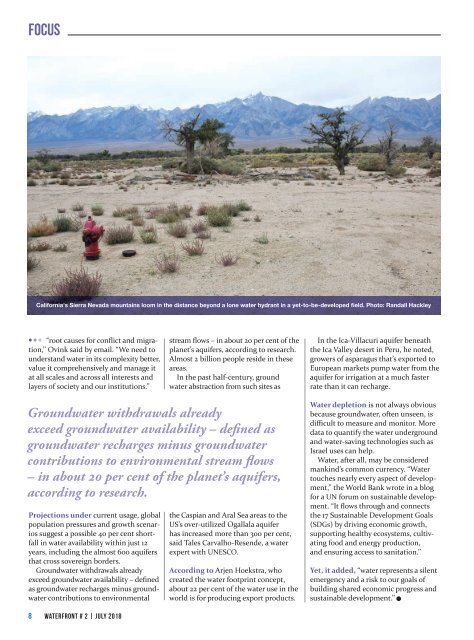Stockholm WaterFront no 2, 2018
In the new issue of WaterFront, we look at the connections between humans and nature. It is an exciting moment in time, when the traditional view on the relationship between ecosystems and human development is increasingly being challenged. In the past, nature has at times been seen as a foe to be conquered, but we’re now starting to realize that nature in fact holds the key to solving many of humanity’s most pressing challenges. Yet, the shift is not happening fast enough. Investment in nature-based solutions and ecosystems research is clearly insufficient. To hopefully help speed things up, this year’s World Water Week will explore some of these issues through its theme Water, ecosystems and human development. In this issue of WaterFront we examine the alarming threat to the world’s major aquifers on page 4. Still, there is also a lot of good news, with signs of a global rethink – on page 12 you can read about how the World Bank wants to bring ecological expertise into their projects at an earlier stage and a story on page 14 explores new tools that help infrastructure planners calculate climate risks. To learn more about how economists are trying to bring ecosystems into the equation, turn to page 18. Last, but not least, don’t miss Torkil Jønch Clausens’ analysis of what really happened at the High-level Political Forum on page 22. Enjoy the read!
In the new issue of WaterFront, we look at the connections between humans and nature. It is an exciting moment in time, when the traditional view on the relationship between ecosystems and human development is increasingly being challenged. In the past, nature has at times been seen as a foe to be conquered, but we’re now starting to realize that nature in fact holds the key to solving many of humanity’s most pressing challenges.
Yet, the shift is not happening fast enough. Investment in nature-based solutions and ecosystems research is clearly insufficient. To hopefully help speed things up, this year’s World Water Week will explore some of these issues through its theme Water, ecosystems and human development.
In this issue of WaterFront we examine the alarming threat to the world’s major aquifers on page 4.
Still, there is also a lot of good news, with signs of a global rethink – on page 12 you can read about how the World Bank wants to bring ecological expertise into their projects at an earlier stage and a story on page 14 explores new tools that help infrastructure planners calculate climate risks. To learn more about how economists are trying to bring ecosystems into the equation, turn to page 18.
Last, but not least, don’t miss Torkil Jønch Clausens’ analysis of what really happened at the High-level Political Forum on page 22.
Enjoy the read!
You also want an ePaper? Increase the reach of your titles
YUMPU automatically turns print PDFs into web optimized ePapers that Google loves.
FOCUS<br />
California's Sierra Nevada mountains loom in the distance beyond a lone water hydrant in a yet-to-be-developed field. Photo: Randall Hackley<br />
“root causes for conflict and migration,’’<br />
Ovink said by email. “We need to<br />
understand water in its complexity better,<br />
value it comprehensively and manage it<br />
at all scales and across all interests and<br />
layers of society and our institutions.’’<br />
stream flows – in about 20 per cent of the<br />
planet’s aquifers, according to research.<br />
Almost 2 billion people reside in these<br />
areas.<br />
In the past half-century, ground<br />
water abstraction from such sites as<br />
In the Ica-Villacuri aquifer beneath<br />
the Ica Valley desert in Peru, he <strong>no</strong>ted,<br />
growers of asparagus that’s exported to<br />
European markets pump water from the<br />
aquifer for irrigation at a much faster<br />
rate than it can recharge.<br />
Groundwater withdrawals already<br />
exceed groundwater availability – defined as<br />
groundwater recharges minus ground water<br />
contributions to environmental stream flows<br />
– in about 20 per cent of the planet’s aquifers,<br />
according to research.<br />
Projections under current usage, global<br />
population pressures and growth scenarios<br />
suggest a possible 40 per cent shortfall<br />
in water availability within just 12<br />
years, including the almost 600 aquifers<br />
that cross sovereign borders.<br />
Groundwater withdrawals already<br />
exceed groundwater availability – defined<br />
as groundwater recharges minus groundwater<br />
contributions to environmental<br />
the Caspian and Aral Sea areas to the<br />
US’s over-utilized Ogallala aquifer<br />
has increased more than 300 per cent,<br />
said Tales Carvalho-Resende, a water<br />
expert with UNESCO.<br />
According to Arjen Hoekstra, who<br />
created the water footprint concept,<br />
about 22 per cent of the water use in the<br />
world is for producing export products.<br />
Water depletion is <strong>no</strong>t always obvious<br />
because groundwater, often unseen, is<br />
difficult to measure and monitor. More<br />
data to quantify the water underground<br />
and water-saving tech<strong>no</strong>logies such as<br />
Israel uses can help.<br />
Water, after all, may be considered<br />
mankind’s common currency. “Water<br />
touches nearly every aspect of development,’’<br />
the World Bank wrote in a blog<br />
for a UN forum on sustainable development.<br />
“It flows through and connects<br />
the 17 Sustainable Development Goals<br />
(SDGs) by driving eco<strong>no</strong>mic growth,<br />
supporting healthy ecosystems, culti v-<br />
ating food and energy production,<br />
and ensuring access to sanitation.’’<br />
Yet, it added, “water represents a silent<br />
emergency and a risk to our goals of<br />
building shared eco<strong>no</strong>mic progress and<br />
sustainable development.’’<br />
8 WATERFRONT # 2 | july <strong>2018</strong>


















